Four months before Juneteenth was declared a national holiday, Denver City Council, on Feb. 22, 2021, unanimously voted to make it an official commemorative holiday in Denver, to be celebrated on the Saturday closest to June 19. But Juneteenth celebrations in Denver can be traced all the way back to 1953 when businessman Otha Rice, who had a bar in Five Points, started the Juneteenth tradition in Denver.
Abraham Lincoln officially ended slavery with the Emancipation Proclamation on Jan. 1, 1863, but enslaved people in Texas only learned about it on June 19, 1865 when Union General Gordon Granger arrived in Galveston, Texas and announced, “The people of Texas are informed that, in accordance with a proclamation from the Executive of the United States, all slaves are free. This involves an absolute equality of personal rights and rights of property between former masters and slaves, and the connection heretofore existing between them becomes that between employer and hired labor.” (Texas State Library)
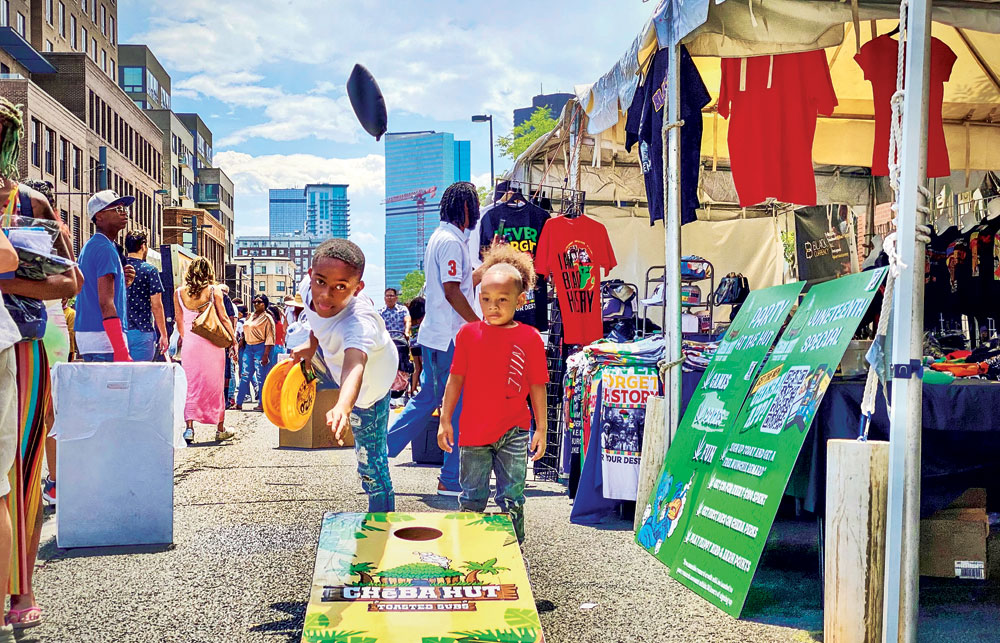
At Denver’s Juneteenth celebration in Five Points on June 19 & 20, adults hugged old friends after a long year apart, patronized Black-owned businesses, and danced to live gospel and other music as children enjoyed activities offered by vendors. Above, Josiah McQuery, 11, tosses a bean bag in a cornhole game as his cousin Lavell McQuery, 4, watches intently. Josiah’s mom, Tashyla Jackson, says, “Juneteenth to me means celebrating being Black, it means family, it means happiness, it means prosperity.”
![]()
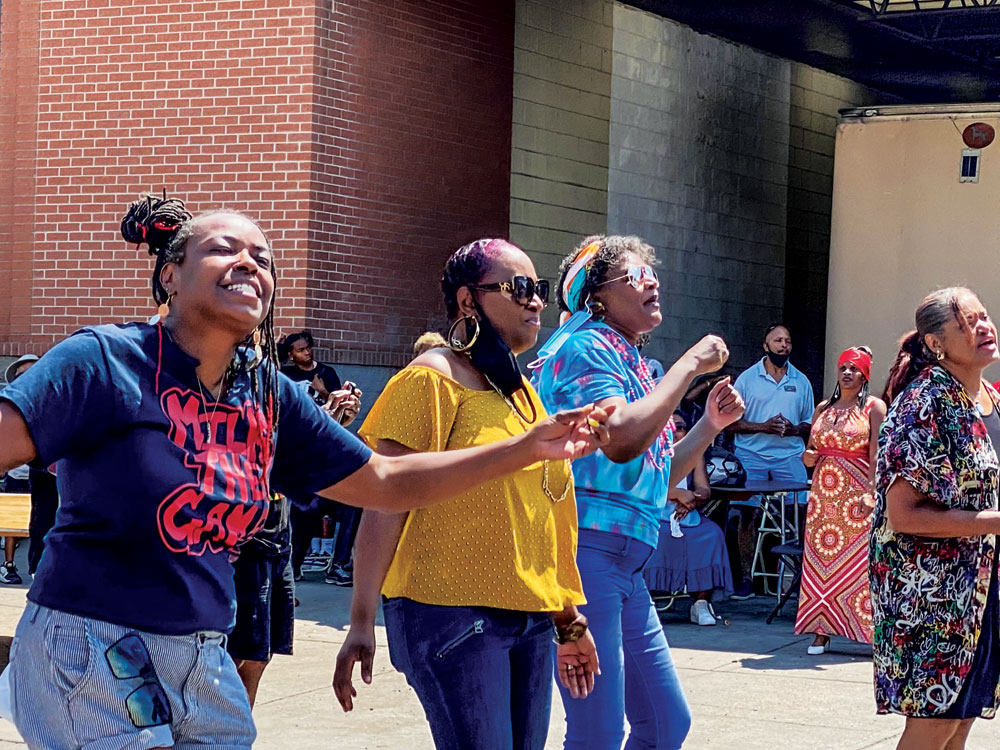
An Aurora Grandma: Today symbolizes for African Americans our freedom. I mean to me it’s just as significant as the Fourth of July. That’s the United States holiday, and Juneteenth is African Americans’ holiday for our freedom. I celebrate it every year and I try to support just about every event…the concerts and the food and the interactions.
![]()
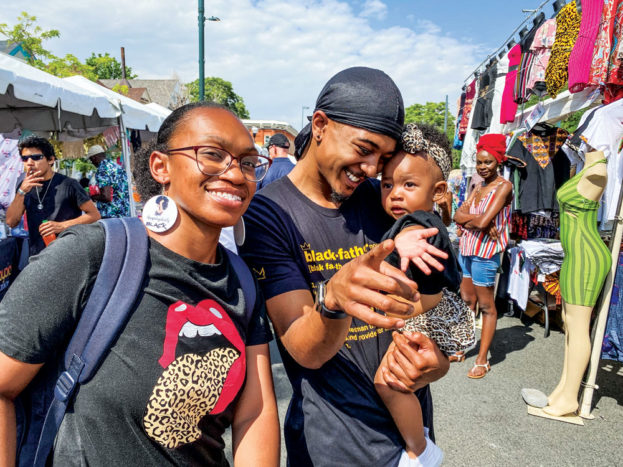
Ty James and Nicole Henley with Desiree, 14 months
Ty: For Juneteenth, we’re a culture here. Everybody either knows somebody that’s around here or we’re just coming to meet new people. It’s a very essential thing for our culture to have because if we don’t have a place where we can have a reunion, like we do every year for the past 10-plus years anyway, before it even became a national holiday—it was the best thing ever for us. This is where we came to release. This is where our summer started. This is where everybody found out about new people, found out about new businesses, clothing, family. Anything that you can think of, it’s here.
![]()
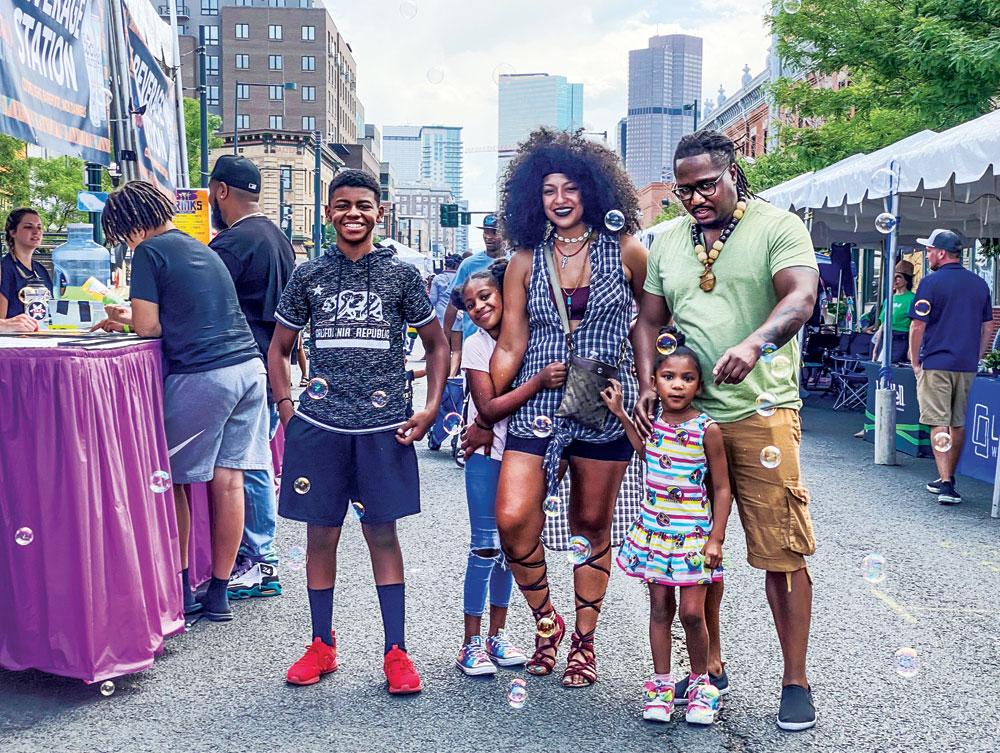
Khysin Adoshe—We are out here celebrating the holiday of Juneteenth, which is now a federal national holiday. This was the freedom from slavery, actually, so we appreciate it. Before we came today, we told our kids the importance of celebrating Juneteenth and why history should never repeat itself. We should know what history is so we can further our future. My mother didn’t really tell me about Juneteenth, I had to do the research myself. And from that, I am now teaching my children.
![]()
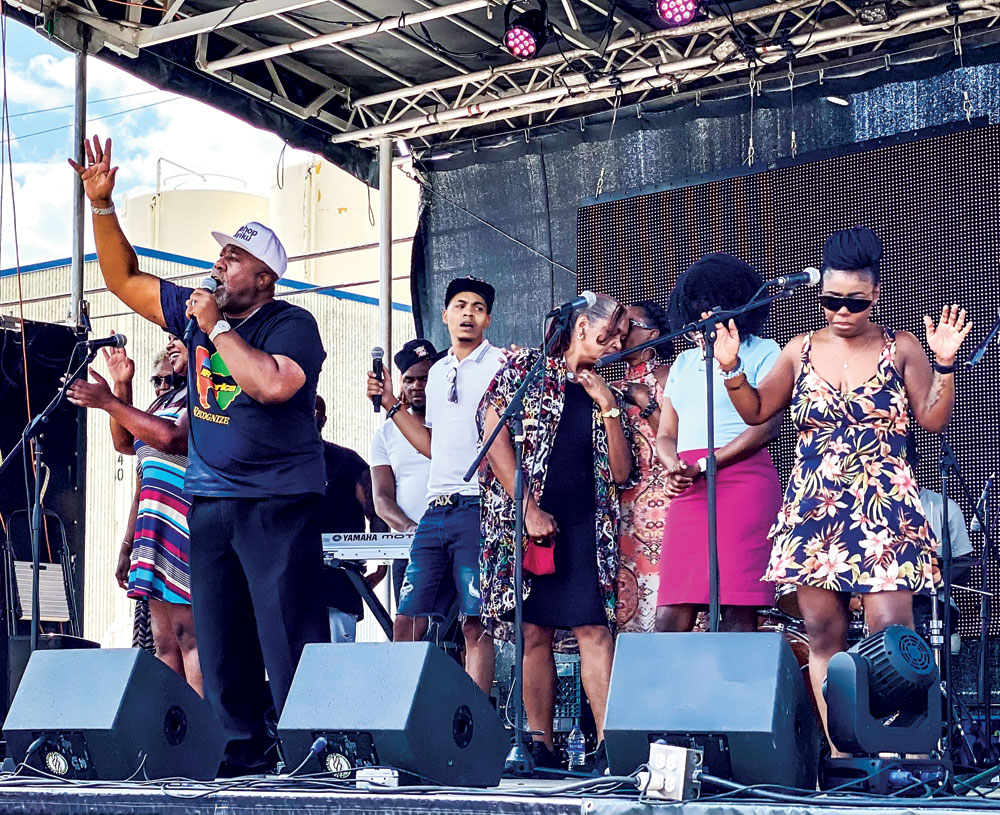
The Absolute Gospel Praise Team led the Sunday afternoon music performances as attendees danced in the street and gathered in the nearby shade to celebrate Juneteenth.
![]()
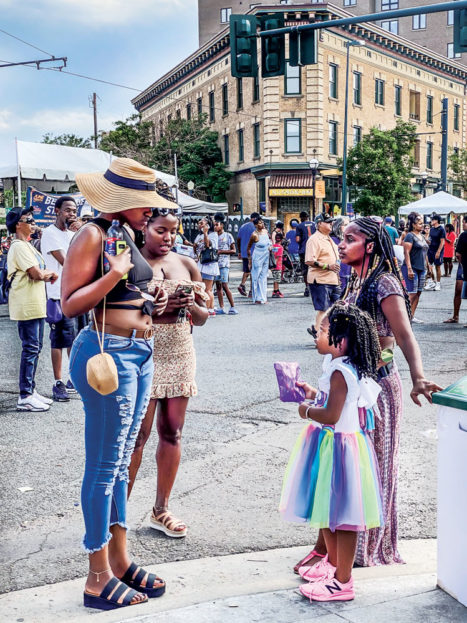 Shaunie Starr (right): I come to Juneteenth to export all of the products that Haiti has to offer. Shaunie Starr Imports offers international artwork, natural cocoa, natural beans, natural lotions—everything at Juneteenth.
Shaunie Starr (right): I come to Juneteenth to export all of the products that Haiti has to offer. Shaunie Starr Imports offers international artwork, natural cocoa, natural beans, natural lotions—everything at Juneteenth.
Naomi Patterson (front left): I come to Juneteenth because it is a celebration of Black people, it is Independence Day for us, and because I want to support locally-owned Black businesses in Colorado. They have shut down Five Points, which was historically-owned Black companies and businesses, in order to gentrify the area and make it non-Black. So…this is why I come—to support them and make sure they are making money as well.
![]()
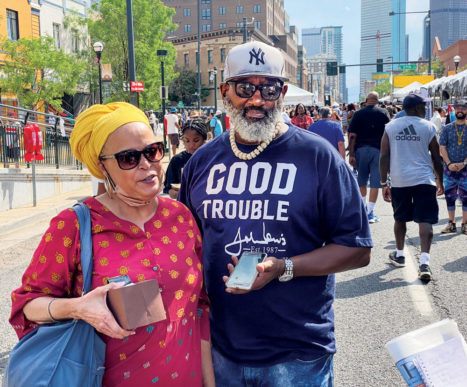 Imani and Hasan Latif, Aurora
Imani and Hasan Latif, Aurora
Imani: This is our community and this is the main time we can get together and see everyone we’ve known for a long time, especially after Covid. There’s African stuff to buy, it’s fun, and it’s safe. The national holiday did surprise me, but I also think that there’s a lot of other things that we would really need besides that. I would love to see the George Floyd Bill and the Voting Rights Bill passed before the holiday…but I’ll take the holiday. I was trying to figure out—we’re celebrating that some people heard about freedom three years later? I didn’t quite get it. But it’s a really good opportunity for us to come together. And we need that. We’re only four percent of the state population…
Hasan: …and most of them are right here today! Our family conversations with kids and grandkids aren’t so much about Juneteenth as they are about pride in your own ethnicity and family. And being empathetic and understanding other people’s issues. We’re just trying to keep our family safe, our grandchildren in particular. We want them to avoid some of the things we had to experience coming up in America as Black people.
I used to work right on this street, about 12 years ago, and you can hardly recognize it anymore. It’s good to see some economic development and growth in the area, but I’m just concerned about those people that have been displaced as a result of it.
![]()
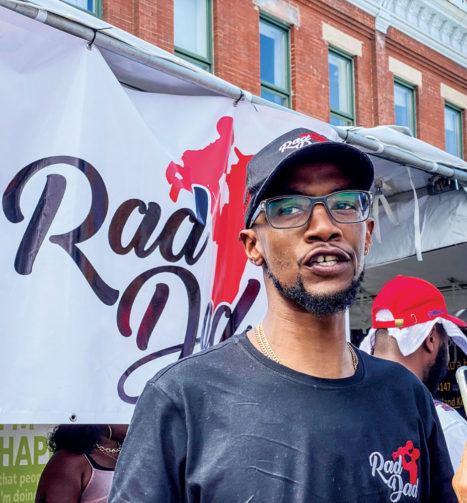 Quentin Lewis: Rad Dad is an acronym for reactivate active and dedicated dads. What I really want to do is change the narrative that’s been painted specifically for Black fathers and minority fathers that our children are growing up fatherless. I want the true picture of who we are and what we stand for to be seen. My first Juneteenth festival was right here in Five Points when I was five or six. It was something we always looked forward to. My mother would buy outfits and stuff just to celebrate this occasion. I never thought, all those years ago, that I would actually be in the event. I believe it’s just coming to light what the real celebration of Juneteenth is, the actual last day of slavery. I’m letting my children know that the freedoms we have were not given to us overnight. There were a lot of people who literally died for us to be here now. I want them to recognize and appreciate the people who actually did give their lives.
Quentin Lewis: Rad Dad is an acronym for reactivate active and dedicated dads. What I really want to do is change the narrative that’s been painted specifically for Black fathers and minority fathers that our children are growing up fatherless. I want the true picture of who we are and what we stand for to be seen. My first Juneteenth festival was right here in Five Points when I was five or six. It was something we always looked forward to. My mother would buy outfits and stuff just to celebrate this occasion. I never thought, all those years ago, that I would actually be in the event. I believe it’s just coming to light what the real celebration of Juneteenth is, the actual last day of slavery. I’m letting my children know that the freedoms we have were not given to us overnight. There were a lot of people who literally died for us to be here now. I want them to recognize and appreciate the people who actually did give their lives.
![]()
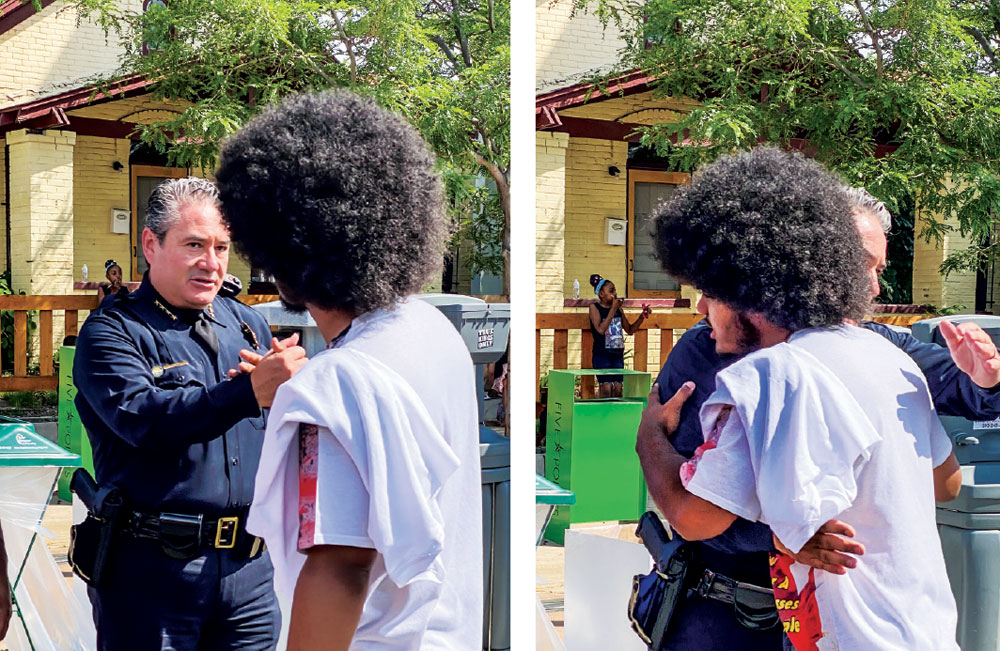
Former District 5 Commander Ron Thomas, now Division Chief of Patrol, was with Police Chief Paul Pazen at Juneteenth. Thomas identified the young man in this photo as Elijah Beauford, who goes by the title, “The Young Activist,” and said he has been helpful in the past and has offered again to assist DPD with meaningful and authentic dialogue between police and the Black community.
![]()
Interviews by Carol Roberts, Photos by Steve Larson




0 Comments